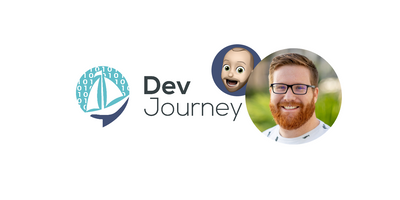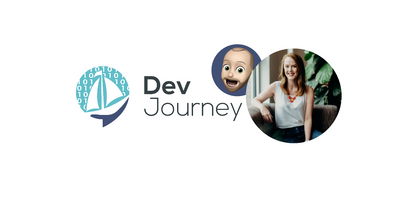This week, I published Ryan Hamblin's #DevJourney story on my eponym Podcast: Software developer's Journey. Among many other things, here are my main personal takeaways:
- Ryan's first career took him toward sports, the outdoors, the medical field, and physical disabilities. He loved his job and the field, but he couldn't project himself in a future where he would be earning minimum wage for a long time. So he decided to embrace a 12 weeks program and become a developer.
- Before beginning his Bootcamp, Ryan connected with a dozen developers and CTOs, touring their offices and discovering their job.
- Starting in a completely new industry was very bizarre for Ryan. Everything was new. He didn't know what product, QA, agile, standup were supposed to be. He told us the tale of how he accidentally committed a whole pet project into the main codebase after doing a "git add ." instead of adding files one by one.
- His first job as a developer didn't work out, but he realized that making money and being employed were two different things. This gave him the confidence he needed to rebound and find a new job.
- In this new job, Ryan experienced effective mentorship firsthand. For instance, his mentor fed him articles and asked him to analyze what they were doing together in light of those articles. But working with WordPress wasn't his passion. So he went back to school for another Bootcamp. This time focused on Javascript and algorithmic. This was very stressful but also a phase Ryan enjoyed very much.
- While his first Bootcamp was very traditional, lecture-style teaching, the second one was overly heavy on pair-programming. The second Bootcamp also made him create a small project and then swap code with another group and add further features. I love this idea. This sounds like the closest you can come to what we do every day.
- Ryan said: "to break into a new industry; you have to foster the mindset of being a learner forever", and to learn, "choose the right things to fail at and fail at it enough to start to understand it."
- When I asked Ryan how he finds what to learn, he differentiated between what he needs to learn and what he wants to learn. When he is not forced to learn something by his day job, he encourages us to try and understand the big picture. Also, try to recreate the things we learned along the way in another language/technology. I confronted Ryan with Shawn Wang's comment of going deep whenever you have a chance. His answer was along the lines of "in depths, but on the right things. But beware of rabbit holes. Evaluate the value of what you are putting your time into."
- On the subject of passion, Ryan said, "coding is awesome, but you don't have to love to code to be a functioning member of our industry." But he also revised his thoughts a little bit, saying that you then shouldn't compare yourself to <insert here some industry guru's name>. They are driven by passion. If you were to compare yourself to them, you would be setting yourself up for disappointment or, even worse: failure.
- I asked Ryan what he took from his first experience as a developer (after his first Bootcamp) into his second (after his second Bootcamp), and his answer was "the culture of why." His first manager had the habit of asking "why" all the time. This pushed Ryan to speak confidently about his work and make sure he understood what he was doing thoroughly.
- In his first job as an exercise science specialist, Ryan learned experiential learning. The idea is that experiencing something helps you learn it "learning by doing." But the key concept, which is often skipped, is the retrospective.
Advice:
- "Learn something by doing it (experientially), and then teach it to someone else, and then give back to your local community."
Quotes:
- "I wanted to find something that I enjoyed, maybe not my first passion, but something that pays well enough that I can afford to do the things I am truly passionate about."
- "I knew that learning by doing was the best way for me."
- "Chose the right things to fail at and fail at it enough to start to understand it."
- "You signed up to be a life learner."
- "Coding is awesome, but you don't have to love to code to be a functioning member of our industry."
- "Do what you love, and you will find a crossover."
- "Tying our self-worth with our work is a very dangerous trap to get into."
Thanks, Ryan, for sharing your story with us!
You can find the entire episode and the show notes on devjourney.info.
Did you listen to his story?
- What did you learn?
- What are your takeaways?
- What did you find particularly interesting?



